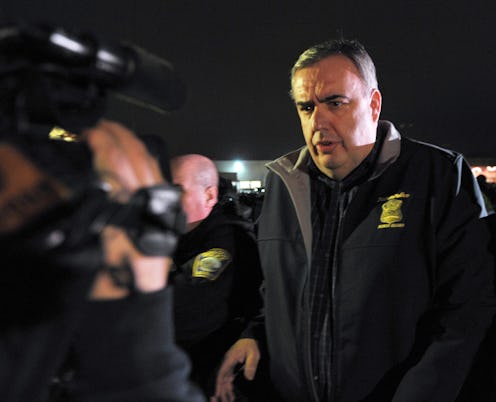News
Boston Bombing Film Will Be Based On Commissioner
Soon after the defense rested its case in the trial of alleged Boston Marathon bombing suspect Dzhokhar Tsarnaev, CBS Films announced Mark Wahlberg would produce a feature film detailing the tragic incident and the five-day manhunt that followed. As Tsarnaev awaits his fate — likely life in prison or death — for his alleged role in the event that left three people dead and hundreds injured, the trial has laid out exactly what happened in those few days, which the movie will attempt to capture on the silver screen. But the film, titled Patriots' Day, will come from the perspective of a key figure who is extremely knowledgeable about the case: Ed Davis, the Boston police commissioner from 2006 to 2013.
Davis grew up in Lowell, Massachusetts, where he came from a family of police. In his early 20s, he joined the local police force in 1978 and stayed there for 28 years. While working full-time, Davis went to college on the weekends, working toward a bachelor's degree in criminal justice and human services at Southern New Hampshire University, an hour away. He later received his master's degree in criminal justice from Anna Maria College. While at the Lowell Police Department, Davis worked his way up to chief, having serving as a beat cop, vice and narcotics officer, detective, detective sergeant, detective lieutenant, and finally, the now Capt. Davis was named superintendent of Lowell police.
Davis became the Boston police commissioner in late 2006 after leading Lowell to a 60 percent decrease in crime during his tenure. Then Boston Mayor Thomas Menino announced his appointment, stating how impressed he was with Davis' leadership and recognizing his accomplishments. In a press release at the time, Davis said:
I am honored that Mayor Menino has entrusted me to lead the historic Boston Police Department. ... Increasing community trust in police has always been my top priority. Lowell has molded my commitment to neighborhoods and the enormous power of citizens in crime reduction strategies. I will never forget the powerful lessons I have learned from my home town.
In his seven years as commissioner, which, The Boston Globe reports were relatively calm, Davis saw serious crime reduced by 30 percent, with shootings down 40 percent in just his first three years. Although The Boston Globe writes that people were initially hesitant about Davis' hire, fearing that he would be overwhelmed in a city much larger than Lowell, but when the Boston Marathon was attacked on April 15, 2013, Davis stepped up and became a nationwide hero and celebrity, largely due to his status as a take-charge commissioner.
In an interview with 60 Minutes a week after the bombing, Davis described the horror of the Boston Marathon bombing as something the likes of which he had only ever seen in places overseas. He himself had been at the finish line mere minutes before the bombs went off, but had stepped away to take a phone call. When he returned,
I saw Officer Michael Barrett from the Boston Police Department wade into an unbelievable scene of carnage and put the fire out on an individual that was still on fire and then grab belts off people and put tourniquets on the man's legs so he could save his life.
When law enforcement encountered the brothers and then eventually found Dzhokhar hiding in a boat, Davis was there. He was in command throughout the manhunt for the Tsarnaev brothers, who he says looked like college kids, not cold blooded killers.
I thought about the death of the 8-year-old boy, the Martin child. And how someone who didn't appear to be particularly evil could do such an evil thing.
But despite the horrors that he saw, Davis managed to stay, as they say, "Boston Strong." During a commencement address at the University of Massachusetts, Davis addressed his time as police commissioner during the attack, and said:
I learned to think the unthinkable. I learned that the most horrific of circumstances can produce the most inspirational and heroic of actions, not just by one single person, but by hundreds of them.
Davis resigned from the Boston Police Department in September 2013, a few months after the Boston Marathon bombing. At that time, he was pursuing a fellowship with Harvard University's Institute of Politics to both teach and take classes, according to The Boston Globe. Although his time as commissioner was described as "masterful" by the Boston NAACP chapter president, Davis had also been criticized at the time for not fully addressing the issue of diversity within the police force.
Davis is now a news security analyst for WBZ-TV, the CBS affiliate in Boston. He also consults on security issues for The Boston Globe, and just in February, Davis was hired as an advisor to Shooter Detection Systems LLC, which makes detectors that notify police of gunfire. Its CEO, Christian Connors, said:
He is synonymous with policing and progressive law enforcement, and he is a true and proven leader.
Davis gave his life rights to CBS Films for Patriots' Day, though it's not known how much he received. But with his deep connection to the Boston Marathon bombing, his role in the movie's production should provide it with more accuracy and emotion than it would have otherwise. The film is being produced in conjunction with a 60 Minutes producer, and Davis says:
I talked to them at length and I thought it would be better to have some input — to make sure that the depiction was done properly.
Images: Getty Images (4); David Wilson/Flickr (1)
